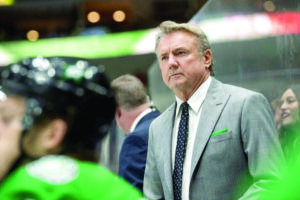By David Mullen
The National Hockey League in general and the Dallas Stars in particular have never been known for “transparency,” today’s overused political term assuring that there is nothing to hide.

Photo courtesy of KERA News
Player pain is often approximated. “An upper body injury” could mean anything from a broken thumb to a fractured clavicle to appendicitis. “A lower body injury” could be a broken ankle or jock itch, although that latter malady would never get any real hockey player scratched.
That is why it should come as no surprise that a vague statement by the Dallas Stars released on May 20 stated, “Rick Bowness is stepping down as head coach of the Dallas Stars.” The team had failed to advance past round one in the Stanley Cup Playoffs four days earlier, losing 4 games to 3 against the Calgary Flames.
The Flames looked bigger, faster and stronger throughout the hard-fought series. Bowness deserves some credit that the series went seven games. A superhuman effort by goaltender Jake Oettinger forced game 7 into overtime, giving the Stars a chance to avoid what seemed inevitable.
“After careful consideration with my wife Judy, we feel it’s best to step away and allow the organization the opportunity to pursue a different direction at the head coaching position,” Bowness, 67, said in the release. But it just feels like the Stars wanted to go in another direction, as if covering up a player’s injury.
Bowness’ contract had expired, and it may have been his decision, but all along he talked like he expected to return behind the bench for one more season. The Stars may have had other ideas.
At the same time as the Bowness announcement, the team released coaches John Stevens, Derek Laxdal and Todd Nelson. That was clearly a team decision. Bowness’ decision remains as ambiguous as an upper body injury.
Bowness was rushed into duty as an interim head coach in 2020 after the abrupt firing of Jim Montgomery due to “unprofessional conduct.” Bowness had been on the bench managing the team’s defense and was now challenged with trying to inspire an offense and power play that for various reasons — injuries, big contracts, team philosophy — had underperformed.
Stars’ scoring has been among the NHL’s lowest for years. Jamie Benn and Tyler Seguin have seen scoring declines since signing long term contracts. The lack of an effective power play held the team back. In the last few seasons, the Stars have played hockey’s version of the “rope-a-dope:” scratch out a few goals, take a defensive position in the third period and hope the other team runs out of steam.
But Bowness earned the respect of the players and is credited with — shockingly — guiding the Stars to the Stanley Cup Finals in a truncated 2020 season marred by COVID-19. Home playoff games were played in Edmonton, not in the friendly confines of Victory Park. General Manager Jim Nill cited Bowness for leadership during “unprecedented global events that affected our players and staff both on and off the ice.”
Dallas was Bowness’ sixth stop, holding previous head coaching positions in Ottawa, Boston, Winnipeg, New York (Islanders) and Phoenix. With the Stars, he leaves compiling a winning regular season and playoff record. He led the Stars to a 98-point season in 2021-22, their second-best point total in 15 years.
But in true Stars fashion, it took to the end of the season for Dallas to secure a final playoff spot and, even then, it was with a 3-2 overtime loss to the Vegas Knights thanks to an implosion by the Nashville Predators.
The NHL is rapidly changing, and the Stars may not be adapting quickly enough. One way or another, Bowness and his staff were viewed as the wrong people to move the team ahead.
Team owner Tom Gaglardi, the British Columbian restaurant and hotel magnate, will no doubt have a say in the future coach, although the team maintains it will be up to Nill. It is reported that after a meeting between Nill and Gaglardi, the team decided it wanted to move in a different direction, and Nill stated the search for a new head coach will begin immediately.
All in all, the Stars will enter the 2022-23 season in decent shape. They are a playoff team. They have a strong defense and appear to have found the goaltender for the future in Oettinger. Their farm system is solid. They will be cash strapped for free agents, due to salary cap issues. A big trade could bring in much needed offense.
In the offseason, they will need to decide if free agent defenseman John Klingberg remains with the team and then find the money to sign him. The Stars also have just one reliable goalscoring line in Jason Robertson, Roope Hintz and Joe Pavelski and must find more firepower.
The Dallas Stars have been through eight coaches in 23 years since their first and only Stanley Cup title.
The Stars will be looking to hire a coach that will maintain a defensive presence but infuse a philosophy that is more offensive minded.
“Rick is one of the most respected and beloved individuals to have ever coached in the NHL,” Nill said in a statement.
“His dedication and commitment to the game, and the impact that he’s made on countless players, coaches and support staff throughout his five decades in the League is unmatched.”
The real reason Rick Bowness won’t be back next season may never be known. The Dallas Stars front office may be suffering from the phantom “upper body injury.” No one will truly know what is wrong, but just know that it is time to get better.
